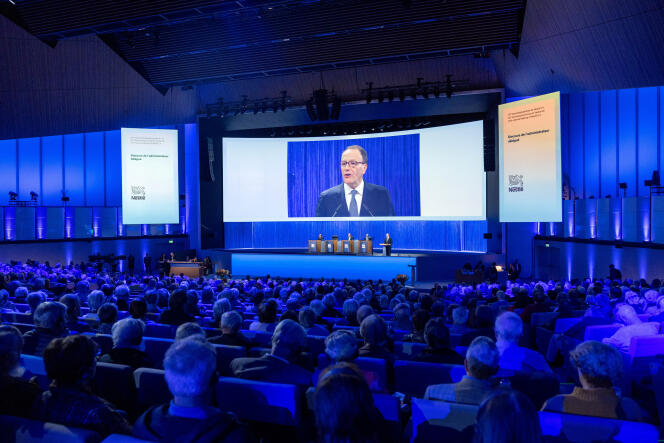


There's always something a little liturgical about the annual high mass of one of the world's capitalist behemoths, a tedious enumeration of the board's proposals, endorsed by Soviet scores. The unexpected happened three hours after the ceremony began. There was 20-year-old Becky, an activist with the London-based NGO Bite Back, waging a war against junk food. Standing at the lectern in front of top executives, overlooking the crowd of small shareholders and institutional investors at the conference center of the Ecole Polytechnique Fédérale de Lausanne in Switzerland, she hesitated, then proclaimed, "Groups like yours are flooding our streets with junk food. One in three children in Britain's inner cities will develop health problems from harmful products they have no chance of escaping. When are you going to take responsibility?"
On Thursday, April 18, activist shareholders came to voice their concerns and grievances to the Nestlé Group. The company with over 100 brands (including KitKat, Smarties, Perrier, Nescafé, Nesquik, Maggi and La Laitière) has been struggling to cope with an unfavorable atmosphere in recent months. With its share price suffering, sales down (-1.5%, to 93 billion Swiss francs in 2023, or €96.3 billion), and reputation under threat, the world's 35th largest company by market capitalization (nearly $268 billion, or €252 billion) is going through a rough patch. In March, Nestlé admitted using disinfection treatments in France and Switzerland to "guarantee the food safety" of its bottled waters, though such processes are prohibited for mineral waters.
And earlier this week, the Swiss NGO Public Eye, which examines the probity of numerous multinationals based in the Swiss Confederation, called into question Nestlé baby products, which contain added sugar in Global South countries such as the Philippines, Nigeria and Senegal, whereas this is not the case in western countries. Out of 78 products of the Cerelac baby cereal brand in Africa, Latin America and Asia, 75 contain added sugar, averaging 4 grams (a square of sugar) per serving. "Nestlé's sole aim, and that of other manufacturers, is to create an addiction or dependency in children because they like the taste of sugar," denounced Laurent Gaberell, a specialist in agriculture and food at Public Eye. The practice is contrary to the recommendations of the World Health Organization, which wants to drastically limit sugar intake in young children's diets in order to combat the global obesity epidemic.
You have 53.11% of this article left to read. The rest is for subscribers only.
